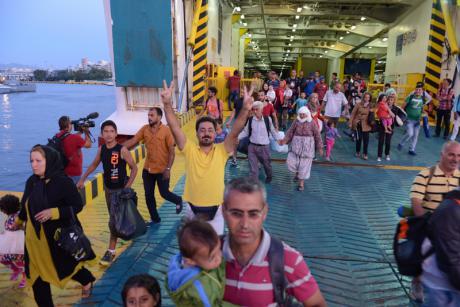By ANDREW RETTMAN, EuObserver
“The EU-Turkey Statement is holding in terms of low migrant arrivals and enables to ensure an effective management of migratory flows along the route”, the note said.
It said “illegal border crossings through the route into the EU have been low since April 2016”.
The positive assessment comes despite a diplomatic row in which top German politicians said the EU should end Turkey’s accession talksdue to president Recep Tayyip Erdogan’s authoritarian rule and in which he accused them of “Nazism”.
It also comes despite recent reports in Greek media that the number of refugees coming from Turkey to Greek islands was rising.
The EU-Turkey statement was a 2016 deal for Turkey to stop migrants in return for faster EU visa-free travel, financial aid, and other perks.
The Estonian note, which was circulated ahead of an EU interior ministers’ meeting on Thursday (14 September), did say Turkey had “demonstrated a lack of cooperation” on taking back some asylum claimants.
It said there were still “continuing arrivals” from Turkey “putting the Greek asylum system and the hotspots facilities on the islands under pressure”.
The “hotspots” are EU-sponsored centres for registering and taking care of new arrivals.
The Estonian note also said Greece should speed up the appeals process for failed asylum claimants so that they could be sent back more quickly.
Spain targeted
It warned that there was a “recent increase” in people crossing from Morocco and Algeria to Spain and that numbers there were already higher this year than for all of last year.
But it said “there is no firm evidence of a shift from the Central Mediterranean towards this route”.
It also said the central route, from Libya to Italy, was currently “experiencing one of the longest lulls since the migration crisis started in 2014”.
It said July and August were the quietest since the summer of 2014 and that numbers were down 17.7 percent so far this year (99,846 persons) compared to the first nine months of last year.
Estonia said the EU should continue to train and equip Libya’s coast guard and should keep on paying Libyan municipalities to stop people from leaving, despite outcries by the UN and leading charities on the abuse and inhumane conditions faced by migrants stuck there.
Estonia also said the EU should step up “voluntary returns” and “voluntary resettlement” – paying migrants in Egypt, Ethiopia, Libya, Niger, and Sudan to go back home instead of coming to Europe.
The International Organisation for Migration (IOM) is working with the EU on returns, while the UN’s refugees agency, the UNHCR, is working with the EU on resettlements.
The IOM, a Geneva-based body, told EUobserver on Tuesday: “We have assisted over 7,000 ‘voluntary humanitarian returns’ from Libya already this year and expect up to 12,000 before the end of the year.”
It added: “Those who choose to use the service and return home, do so voluntarily after weighing options, and the reintegration support is provided to help them land on their feet back home, get started with a new life, start a new business, and so on”.
Summer lull
The UNHCR noted on Monday that 128,669 people had come to the EU via the Mediterranean so far this year compared to 362,753 last year and 1,015,078 in 2015.
Most people so far this year have come from Nigeria (16,624), Guinea (10,291), Cote d’Ivoire (8,747), Bangladesh (8,747), Syria (7,736), Gambia (6,294), and Mali (5,989), and most of them (over 70%) were men.
At least 14,833 people perished on the way since the start of 2014.









